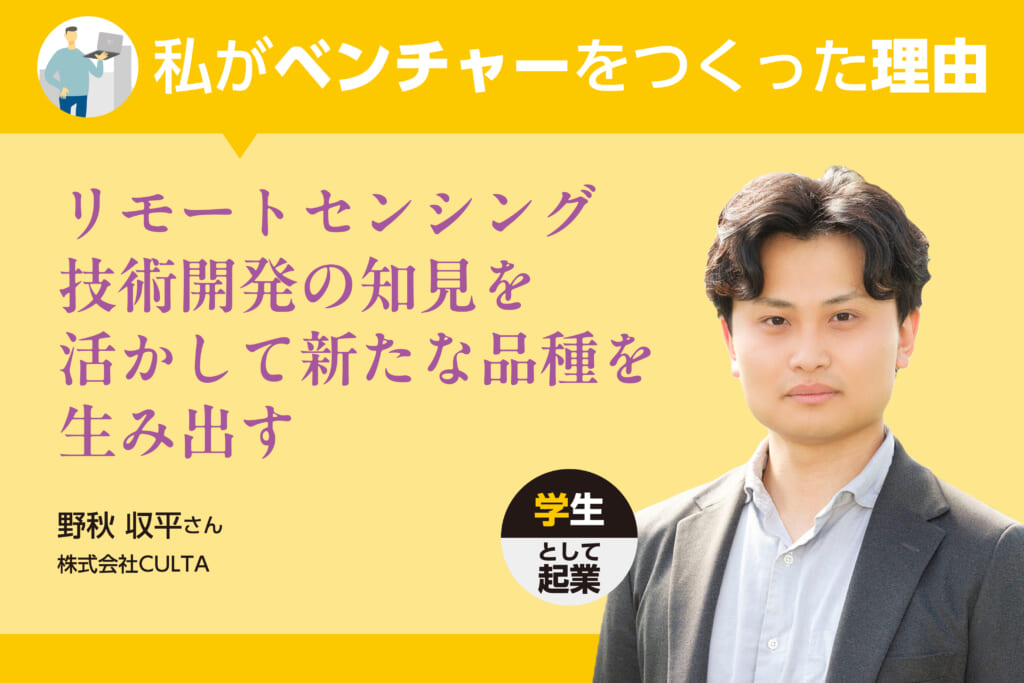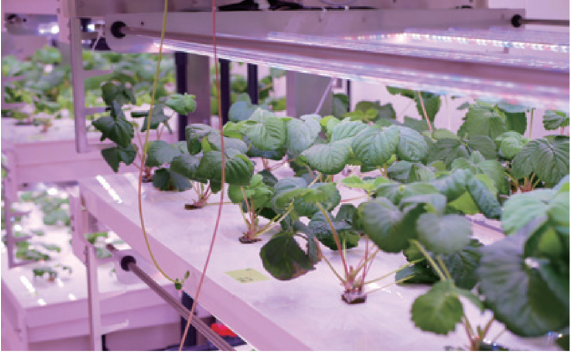- Germination Reactor
<Why I created this venture>Creating new varieties using the knowledge of remote sensing technology development (Shuhei Noaki, CULTA Co., Ltd.)

The company's mission is to "raise the status of agriculture around the world and transform it into a strong industry,CULTA CorporationMr. Noaki is working on speeding up breeding at Although he started his own business as a graduate student and has been involved in agriculture, his undergraduate specialty is chemical engineering. He says he sometimes wondered, "Am I really interested in agriculture?" How did he get involved in research and development in the field of agriculture? (Reprinted from issue 62 of incu-be)
Where can I find my strength?
It can be said that Mr. Noaki became involved in agriculture as an outgrowth of his interest from high school, but his path was not a straight one. His grandparents were dual-income farmers, and agriculture was a familiar part of his life. Since high school, he had been interested in agriculture, chemistry, and the environment, and naturally visited the agriculture department's exhibits at university open campuses. However, after discussing his career path with his parents and others, he realized that he might not have a future as a farmer. Since he also liked chemistry and was interested in biomass energy, he decided to enter the Faculty of Engineering at Tokyo Institute of Technology, thinking that he could learn a wide range of these subjects. However, he could not get a research budget for his biomass energy theme and ended up doing research on petroleum, which he did not find interesting.
Dive in to verify the authenticity of your interest.
In the summer of my junior year of undergraduate school, I was searching for research and technology that would allow me to demonstrate my unique strengths, when I happened to come across a newspaper article on smart agriculture, which combines IT and other technologies to improve agricultural efficiency. I had always been interested in agriculture, and I had a hunch that the combination of agriculture and engineering would be a good fit for me because I would be able to distinguish myself from my rivals. However, I also wondered if my interest was genuine. So I decided to participate in an internship at an agricultural venture. What I worked on was a research project on agricultural ventures in Thailand. It required specialized knowledge in the agricultural field, which was different from my undergraduate work. Mr. Noaki says he is not good at reading books or studying and gets bored easily. During the research, he studied to his own surprise and was able to accumulate knowledge, which convinced him that his interest in agriculture was genuine.

▲High-speed breeding using artificial environment
Research experience that can be used in different fields
Realizing that "you will regret decisions you do not make on your own," Noaki followed his interest in agriculture and entered the Graduate School of Agricultural and Life Sciences at the University of Tokyo. He established CULTA Co., Ltd. at the same time as engaging in research on remote sensing of agricultural land. His first business venture was the distribution and sale of vegetables and fruits. At that time, he noticed that "Amao" strawberries, which he sold wholesale to a cake shop, fetched a higher price than others, and that cakes were also sold at a higher price. If the variety and brand can be differentiated, both the producer and the seller can make a profit. The precedent set by Zespri, famous for its golden kiwi, made me think, "I want to create a system like this. In his research, Mr. Noaki says he has improved his ability to understand what is needed to achieve a goal in a structured manner. He says that he was able to identify necessary technologies through discussions with other researchers and gather colleagues, without being intimidated by the biological research field of breeding. The company is also working to develop original varieties of strawberries and sweet potatoes by combining image recognition and other technologies to speed up variety improvement.
We want to create a breed that creates an era.
Mr. Noaki's current goal is to develop "age-defining varieties" that will be necessary for the next 100 years. Pepper, the driving force of the Age of Exploration, and tea, the catalyst of the Civil War, are just a few examples of the crops that have driven human history. And the agriculture that produces these crops is being forced to change due to climate change. The agricultural sector is said to be the first to be affected by climate change, and in fact, global warming has caused damage to fruit trees due to high temperatures. In such a situation, we can realize sustainable agriculture by creating and expanding crops that can adapt to the next generation, such as developing varieties that can withstand high temperatures. What crops are needed in each region and each era? He is now considering using the current strawberry breeding as a springboard to tackle such global issues. Mr. Noaki's approach of confirming his own interests and making use of his research experience may be a hint to help him find his own field of endeavor.
(Text by Jun Togami)
Profile of Shuhei Noaki
Born in Shizuoka, Japan in 1993. Completed a master's degree at the Graduate School of Agricultural and Life Sciences, The University of Tokyo. Conducted research on the application of image analysis technology to the agricultural field. After working experience in agricultural startups and wholesale markets in Thailand, established CULTA Inc. in 2017. With his strength in high-speed breeding technology, he aims to achieve "vertical integration of agriculture" from variety development to sales, which contributes to improving farmers' profitability.

